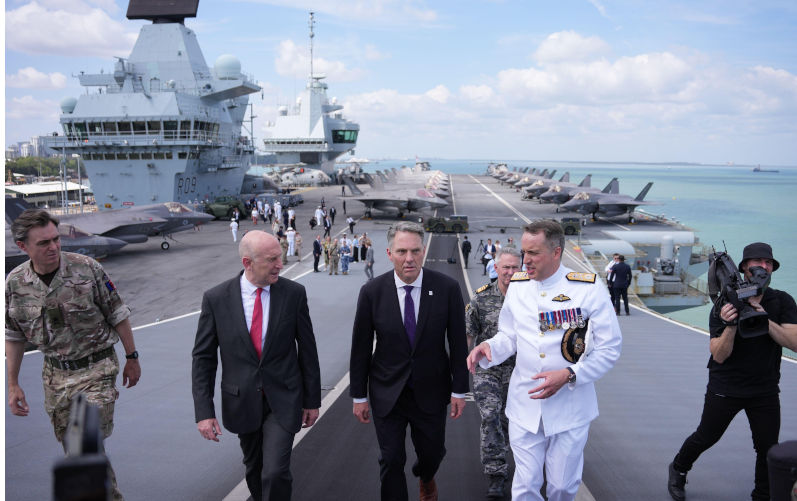Britain’s back, China’s the target. We’ll likely pay the price again
August 1, 2025
Britain’s HMS Prince of Wales has docked in Darwin, flanked by other warships and declarations.
Its Defence Secretary John Healey promises that if push comes to shove in places like the Taiwan Strait, the UK will fight “side by side” with Australia.
Healey’s tone was so assured, so fluent in the language of confrontation, that it barely left room for another outcome – as if conflict with China were not just likely, but scheduled.
Let’s pause there.
The Taiwan Strait — thousands of kilometres from London, far from any British territory, logistics hub, or voter concern, but conveniently close to many of its former colonies — has somehow made its way onto the UK’s forward defence map.
More troubling still, Britain is making military commitments on Australia’s behalf, in our region, without bothering to ask what Australians actually want.
Not so much a strategic deployment as a floating stage – with choppers, Union Jacks, and lofty words, from a kingdom still pretending it has a front-row seat in the Indo-Pacific.
According to the Lowy Institute’s latest polling, 57% of Australians oppose military action to defend Taiwan, even alongside the US.
Yet here comes Britain — a nation that voluntarily walked away from its own regional partnership in Europe — sailing halfway around the world to drag us deeper into a conflict most of us hope to avoid.
The contradiction is stark. China remains Australia’s largest trading partner, accounting for more than $325 billion in two-way trade. Our universities, miners, farmers and exporters depend on Chinese markets for their livelihoods.
Yet we’re committing $368 billion to AUKUS submarines while hospitals lack funding and housing remains unaffordable for young Australians.
Former prime minister Paul Keating put it bluntly: we’re being asked to become “deputy sheriff” in someone else’s fight. We’ve seen this movie before – in Vietnam, Iraq, Afghanistan. Each time, Australia paid the price in blood and treasure for conflicts that weren’t ours to fight.
Healey frames this gunboat diplomacy as strength, as deterrence, as “peace through readiness”. But in practice, it looks a lot like 19th-century muscle memory – a projection of imperial identity long divorced from geopolitical relevance.
Because let’s be honest: if Britain were serious about reducing tension in our region, it wouldn’t be sending warships. It would be sending envoys. It would be brokering confidence-building talks with Beijing, hosting ministerial visits, rebuilding diplomatic capital.
Instead, we get press conferences on a floating airstrip, flanked by missile launchers and flag-draped symbolism, all in the name of securing peace. The internal logic is laughable: Britain claims it wants stability in the Indo-Pacific, yet chooses escalation over engagement.
This isn’t about Australia’s defence. It’s about Britain’s post-Brexit identity crisis.
What would an independent Australian foreign policy look like? We have the blueprint already. Australia successfully mediated East Timor’s independence, built the Pacific Islands Forum, and once punched above our weight as a middle power. Former foreign minister Gareth Evans showed the world how creative diplomacy could solve intractable conflicts, from Cambodia to nuclear disarmament.
We could be hosting regular US-China dialogue in Canberra. We could be leading ASEAN-plus summits that actually produce results. We could be the honest broker our geography positions us to be – trusted by Washington, respected in Beijing, and genuinely useful to regional stability.
We used to be like that.
Instead, we’re outsourcing our foreign policy to nations with their own imperial hang-ups and letting them park their warships in our ports while making commitments in our name.
The human cost matters too. Australian families know what happens when we follow others into their conflicts. We’ve left too many of our people in foreign fields, fighting wars that didn’t make Australia safer or more prosperous.
If we’re serious about peace — actual, durable peace — we need to remember that security doesn’t always come from who’s loudest, or who parks the biggest vessel at our ports. Sometimes it comes from knowing when to speak softly, and having enough regional credibility that both sides are willing to listen.
The age of gunboats has passed. The age of grown-up Australian diplomacy — if we can still remember how to conduct it — might just be our best shot at avoiding the conflicts others seem so eager to fight.
It’s time for our government to ask a simple question: are we making policy for Australia’s interests, or are we just providing the venue for other people’s theatre? Because right now, it’s looking uncomfortably like the latter.
Look, we’ve played this role before: quiet, obedient, uniform pressed, sending our sons and daughters to die in other people’s war.
It’s time we rewrote the script and let the empires know that their royal curtain call shouldn’t come at our expense.
Nor on our stage.
The views expressed in this article may or may not reflect those of Pearls and Irritations.

